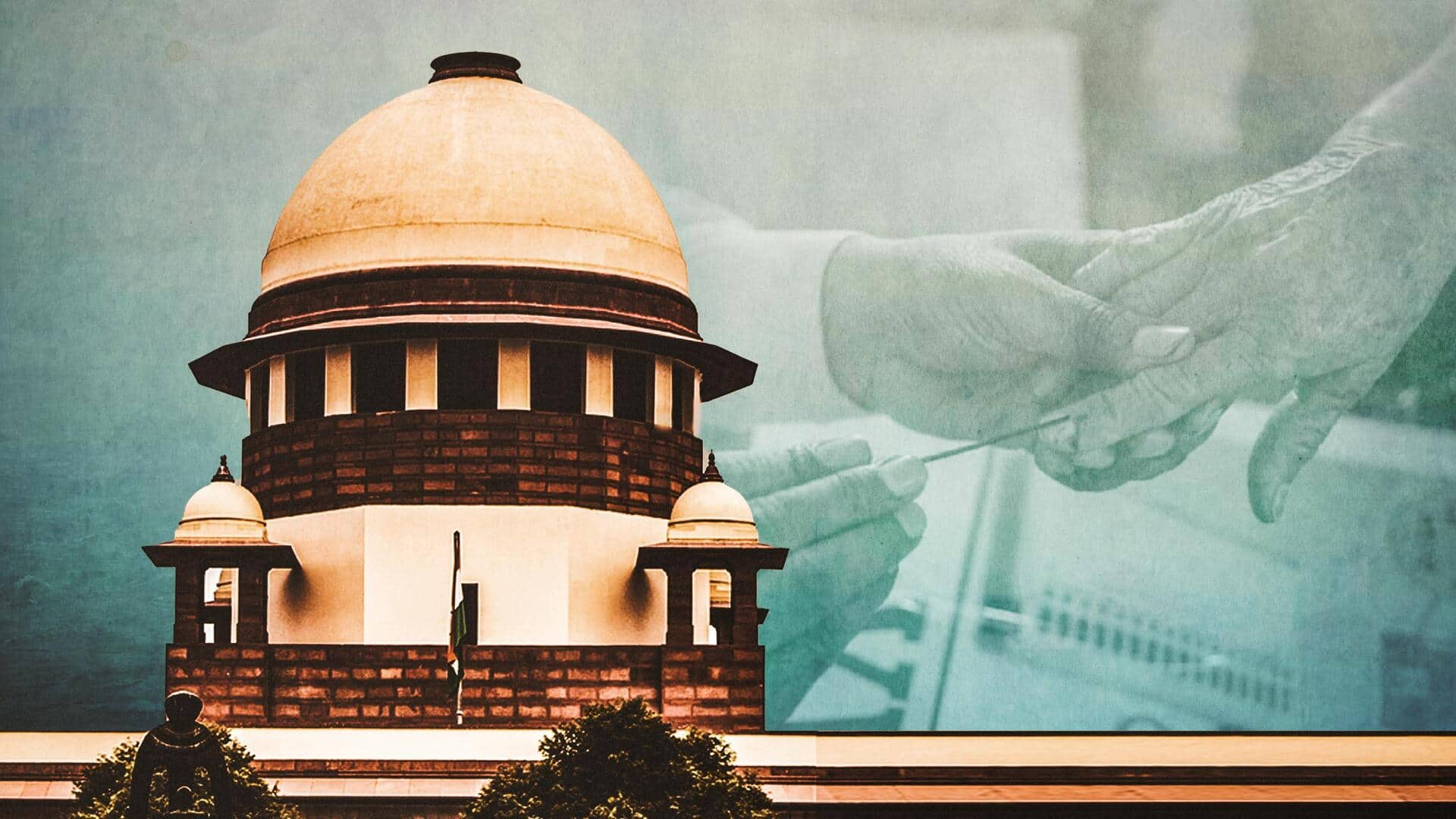
Supreme Court begins hearing pleas against electoral bonds scheme
What's the story
The Supreme Court on Tuesday began hearing a batch of petitions challenging the legality of the electoral bonds scheme.
The matter was referred to a five-judge Constitution bench on October 16 for a "conclusive verdict" on four petitions filed by the Association for Democratic Reforms (ADR), a non-governmental organization (NGO), among others.
Introduced in 2018, the scheme faced opposition from various quarters for allegedly encouraging black money funding in politics by keeping donors anonymous, which the Centre contended.
Context
Why does this story matter?
The central government announced the electoral bonds scheme on January 2, 2018, claiming that it would allow citizens to purchase bonds from the State Bank of India (SBI) to support political parties.
The scheme also allows a qualifying political party to redeem the bonds solely through a bank account.
However, some opposition parties, including the Congress, have accused the Bharatiya Janata Party (BJP) of keeping the scheme "opaque and secretive."
Supreme Court
4 petitions including those by Congress leader, CPI(M)
The Constitutional bench, which includes Chief Justice DY Chandrachud and Justices Sanjiv Khanna, BR Gavai, JB Pardiwala, and Manoj Misra, began hearing four petitions, including those filed by Congress leader Jaya Thakur and the Communist Party of India-Marxist (CPIM).
Meanwhile, in a statement filed before the court ahead of the hearing, Attorney General R Venkataramani asserted that citizens do not have the right to information about the source of the political parties' funds under Article 19(1)(a) of the Indian Constitution.
Proceeding
'Anonymity promotes corruption': Petitioner's counsel
During the hearing on Monday, Advocate Prashant Bhushan, representing the ADR, claimed that anonymity under the scheme was promoting corruption.
"If a citizen has the right to know about candidates, their assets, liabilities, their criminal antecedents, etc., citizens have the right to know about who is funding these political parties," he argued.
The scheme defeated the people's right to be informed about the source of funding of political parties, which is a fundamental right under Article 19(1)(a), he added.
What Next?
Anonymity and concerns over transparency
The identities of electoral bond buyers remain undisclosed to both the public and the Election Commission, making it challenging to trace the origins of political donations.
This has raised concerns that these bonds could facilitate the laundering of illegal funds into the political system.
In 2017, then Reserve Bank of India (RBI) Governor Urjit Patel also reportedly expressed concerns about the potential misuse of electoral bonds, particularly through shell companies.
Insights
Electoral bonds' share in political funding
From March 2018 to July 2023, electoral bonds facilitated the transfer of Rs 13,000 crore to various political parties.
Data released by the Election Commission in January 2023 showed that four national political parties, the BJP, Trinamool Congress (TMC), Congress, and Nationalist Congress Party (NCP), received 55.09% (Rs. 1811.94 crore) of their total income through electoral bonds in 2021-22 alone.
The BJP obtained the majority of these donations, followed by the TMC and the Congress.
Facts
Controversy persists despite formal funding channels
In March 2023, the ADR reported that over 66% cent of the total income of seven national parties came from electoral bonds and anonymous sources.
These parties collected Rs. 2,172 crore from unidentified sources in 2021-22, with 83% (Rs. 1,811.94 crore) originating from electoral bonds.
Although electoral bonds have allowed political parties to receive funding through official channels, concerns about transparency and accountability persist.
The ADR also informed the SC that the ruling BJP received most donations through electoral bonds.
About
More about electoral bonds
Electoral bonds are a means for anonymous Indian citizens/corporations to donate money to political parties.
These bonds are available in multiples of Rs. 1,000, Rs. 10,000, Rs. 1 lakh, Rs. 10 lakh, and Rs. 1 crore and can be purchased at approved SBI offices.
The donor can give these bonds to a party or parties of their choice, which can opt to cash in such bonds within 15 days.
This approach, however, assures that the donor's name stays anonymous.